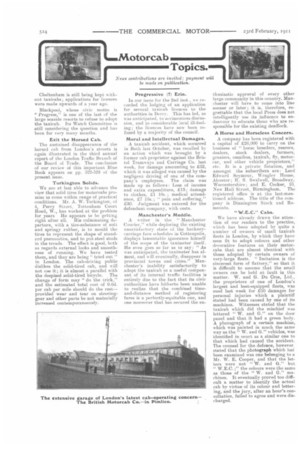Motorcab Topics.
Page 8

If you've noticed an error in this article please click here to report it so we can fix it.
News contributions are invited: payment will be made on publication.
Cheltenham is still being kept without taxicabs; applications for licences were made upwards of a year ago.
Blackpool, whose civic motto is " Progress," is one of the last of the large seaside resorts to refuse to adopt the taxicab. Its Watch Committee is still considering the question and has been for very many months.
Exit the Horsed Cab.
The sustained disappearance of the horsed cab from London's streets is again illustrated in the third annual report of the London Traffic Branch of the Board of Trade. The conclusion of our review of this important Blue Book appears on pp. 322-523 of the present issue.
Torkington Solids.
We are at last able to advance the view that solid tires for motorcabs promise to come within range of practical conditions. Mr. A. W. Torkington, of 4, Percy Street, Tottenham Court Road, W., has worked at the problem for years He appears to be getting right after all. His culminating departure, with a tire-substance of soft and springy rubber, is to mould the tires to represent the shape of standard pneumatics, and to put steel studs in the treads. The effect is good, both as regards external looks and smoothness of running. We have tested them, and they are being " tried out " in London. The cab-driving public dislikes the solid-tired cab, and will not use it ; it is almost a parallel with the despised solid-tired bicycle. The change of form may "do the trick," and the estimated total cost of 0.6d. per cab per mile should do the rest— provided wear and tear on steeringgear and other parts be not materially increased contemporaneously. Progressive (?) Erin.
In our issue for the 2nd inst., we recorded the lodging of an application for several taxicab licences to the authorities in Derry. This has led, as was anticipated, to acrimonious discussion, and to considerable local ill-feeling; the licences have now been refused by a majority of the council.
Moral and Intellectual Damages.
A taxicab accident, which occurred in Bath last October, was recalled by an action which was brought by a former cab proprietor against the Bristol Tramways and Carriage Co. last week, for damage amounting to £52, which it was alleged was caused by the negligent driving of one of the company's employees. The claim was made up as follows : Loss of income and extra expenditure, £13; damage to clothes, Li. 10s.; medical attendance, .27 10s.; " pain and suffering," £30. Judgment was entered for the defendant company, with costs.
Manchester's Muddle.
A writer in the " Manchester Courier," while deploring the existing unsatisfactory state of the hackneycarriage fare schedules in Cottonpolis, displays lamentable ignorance himself of the scope of the taximeter itself. He even goes so far as to say : " As was anticipated, the taximeter has almost, and will eventually, disappear in provincial towns and cities." Manchester's inability satisfactorily to adopt the taxicab as a useful component of its internal traffic facilities is entirely duo to the fact that its civic authorities have hitherto been unable to realize that the combined timeand-distance method of registering fares is a perfectly-equitable one, and one moreover that has secured the en thusiastic approval of every other large community in this country. Manchester will have to come into line sooner or later ; it is, therefore, regrettable that the local Press does not intelligently use its influence to endeavour to educate those who are responsible for the existing deadlock.
A Horse and Horseless Concern.
A company has been registered with a capital of £26,000 to carry on the business of " horse breeders, rearers, dealers, stock dealers, farmers, graziers, omnibus, taxicab, fly, motorcar, and other vehicle proprietors," etc. It is a private flotation, and amongst the subscribers are: Lord Edward Seymour, Wragley House, Alcester ; R. S. Swalwell, Broadway, Worcestershire; and E. Cocker, 10, New Hall Street, Birmingham. The registered office is at the last-mentioned address. The title of the corn. pany is Dinnington Stock and Remounts.
" iat.E.C." Cabs.
We have already drawn the attention of our readers to the practice, which has been adopted by quite a number of owners of small taxicab fleets in London, by which they have seen fit to adopt colours and other decorative features on their motorcabs that are almost identical with those adopted by certain owners of very-large fleets. " Imitation is the sincerest form of flattery," so that it is difficult to assume that the small owners can be held at fault in this matter. W. and G. Du Oros, Ltd., the proprietors of one of London's largest and best-equipped fleets, was sued last week for £.50 damages for personal injuries which a plaintiff stated had been caused by one of its machines. Witnesses stated that the taxicab which did the mischief was lettered " W. and G." on the door panel and that it had a green body. A photograph of a certain machine, which was painted in much the same way as the "W. and G." vehicles, was identified in court as a similar one to that which had caused the accident. The counsel for the defence, however stated that the photograph which had been examined was one belonging to a Mr. W. E. Cooper, and that the letters were not " W. and G." but " W.E.C. ;" the colours were the same as those of the "W. and G." machines. It eventually proved too difficult a matter to identify the actual cab by virtue of its colour and lettering, and the jury, after an hour's consultation, failed to agree and were discharged.






























